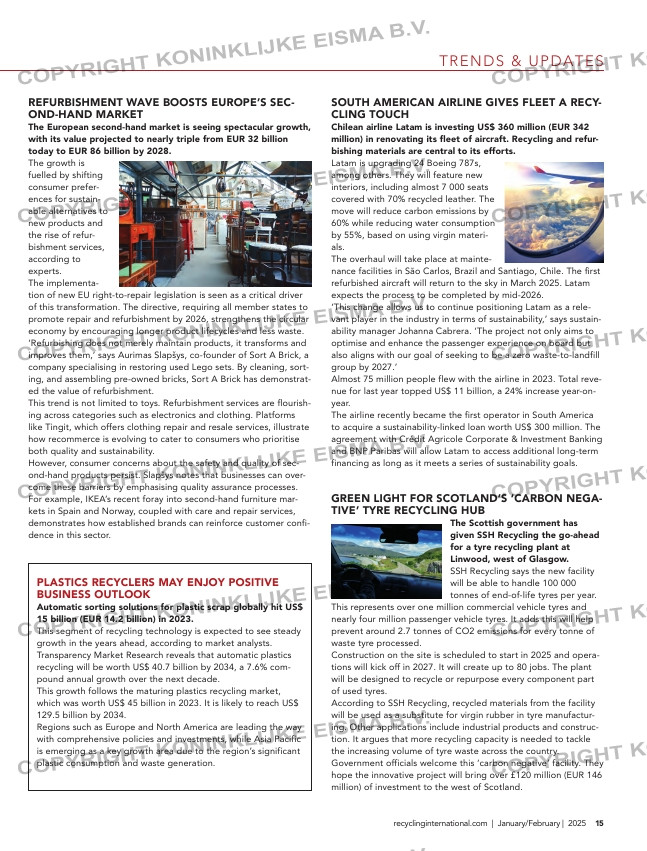Page 15 from: Recycling International Jan/Feb 2025

15
PLASTICS RECYCLERS MAY ENJOY POSITIVE
BUSINESS OUTLOOK
Automatic sorting solutions for plastic scrap globally hit US$
15 billion (EUR 14.2 billion) in 2023.
This segment of recycling technology is expected to see steady
growth in the years ahead, according to market analysts.
Transparency Market Research reveals that automatic plastics
recycling will be worth US$ 40.7 billion by 2034, a 7.6% com-
pound annual growth over the next decade.
This growth follows the maturing plastics recycling market,
which was worth US$ 45 billion in 2023. It is likely to reach US$
129.5 billion by 2034.
Regions such as Europe and North America are leading the way
with comprehensive policies and investments, while Asia Pacific
is emerging as a key growth area due to the region’s significant
plastic consumption and waste generation.
recyclinginternational.com | January/February | 2025
TRENDS & UPDATES
REFURBISHMENT WAVE BOOSTS EUROPE’S SEC-
OND-HAND MARKET
The European second-hand market is seeing spectacular growth,
with its value projected to nearly triple from EUR 32 billion
today to EUR 86 billion by 2028.
The growth is
fuelled by shifting
consumer prefer-
ences for sustain-
able alternatives to
new products and
the rise of refur-
bishment services,
according to
experts.
The implementa-
tion of new EU right-to-repair legislation is seen as a critical driver
of this transformation. The directive, requiring all member states to
promote repair and refurbishment by 2026, strengthens the circular
economy by encouraging longer product lifecycles and less waste.
‘Refurbishing does not merely maintain products, it transforms and
improves them,’ says Aurimas Slapšys, co-founder of Sort A Brick, a
company specialising in restoring used Lego sets. By cleaning, sort-
ing, and assembling pre-owned bricks, Sort A Brick has demonstrat-
ed the value of refurbishment.
This trend is not limited to toys. Refurbishment services are flourish-
ing across categories such as electronics and clothing. Platforms
like Tingit, which offers clothing repair and resale services, illustrate
how recommerce is evolving to cater to consumers who prioritise
both quality and sustainability.
However, consumer concerns about the safety and quality of sec-
ond-hand products persist. Slapšys notes that businesses can over-
come these barriers by emphasising quality assurance processes.
For example, IKEA’s recent foray into second-hand furniture mar-
kets in Spain and Norway, coupled with care and repair services,
demonstrates how established brands can reinforce customer confi-
dence in this sector.
SOUTH AMERICAN AIRLINE GIVES FLEET A RECY-
CLING TOUCH
Chilean airline Latam is investing US$ 360 million (EUR 342
million) in renovating its fleet of aircraft. Recycling and refur-
bishing materials are central to its efforts.
Latam is upgrading 24 Boeing 787s,
among others. They will feature new
interiors, including almost 7 000 seats
covered with 70% recycled leather. The
move will reduce carbon emissions by
60% while reducing water consumption
by 55%, based on using virgin materi-
als.
The overhaul will take place at mainte-
nance facilities in São Carlos, Brazil and Santiago, Chile. The first
refurbished aircraft will return to the sky in March 2025. Latam
expects the process to be completed by mid-2026.
‘This change allows us to continue positioning Latam as a rele-
vant player in the industry in terms of sustainability,’ says sustain-
ability manager Johanna Cabrera. ‘The project not only aims to
optimise and enhance the passenger experience on board but
also aligns with our goal of seeking to be a zero waste-to-landfill
group by 2027.’
Almost 75 million people flew with the airline in 2023. Total reve-
nue for last year topped US$ 11 billion, a 24% increase year-on-
year.
The airline recently became the first operator in South America
to acquire a sustainability-linked loan worth US$ 300 million. The
agreement with Crédit Agricole Corporate & Investment Banking
and BNP Paribas will allow Latam to access additional long-term
financing as long as it meets a series of sustainability goals.
GREEN LIGHT FOR SCOTLAND’S ‘CARBON NEGA-
TIVE’ TYRE RECYCLING HUB
The Scottish government has
given SSH Recycling the go-ahead
for a tyre recycling plant at
Linwood, west of Glasgow.
SSH Recycling says the new facility
will be able to handle 100 000
tonnes of end-of-life tyres per year.
This represents over one million commercial vehicle tyres and
nearly four million passenger vehicle tyres. It adds this will help
prevent around 2.7 tonnes of CO2 emissions for every tonne of
waste tyre processed.
Construction on the site is scheduled to start in 2025 and opera-
tions will kick off in 2027. It will create up to 80 jobs. The plant
will be designed to recycle or repurpose every component part
of used tyres.
According to SSH Recycling, recycled materials from the facility
will be used as a substitute for virgin rubber in tyre manufactur-
ing. Other applications include industrial products and construc-
tion. It argues that more recycling capacity is needed to tackle
the increasing volume of tyre waste across the country.
Government officials welcome this ‘carbon negative’ facility. They
hope the innovative project will bring over £120 million (EUR 146
million) of investment to the west of Scotland.
10-11-12-13-14-15_trendsupdatesi.indd 15 29-01-2025 16:28



